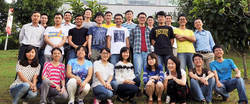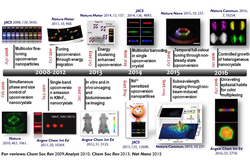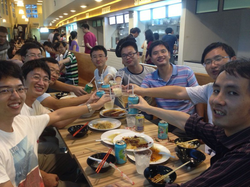Liu Xiaogang

Liu Xiaogang
Dr. Liu Xiaogang is an Associate professor and senior scientist at the National University of Singapore.
Education and Early Life
Dr. Liu was bornin 1974 in Jiangxi, Nanchang, China.He received a B.Eng. from the Nanyang Technological Institute (2002-2006). He obtained a M.Sc. from the National University of Singapore as well as a M.Eng. from the Massachusetts Institute of Technology (2008-2009). He completed his PhD. at the Cavendish laboratory of the University of Cambridge (2010-2014). He began his independent research with a SMART Scholar Fellowship (2014—2016), and joined SUTD as an Assistant Professor in 2017.
Research
Dr. Liu's research interests include o rganic dyes, fluorescent chloride sensors (i.e., viscosity and temperature sensors), fluorophore design and engineering, s olvent effects, m olecular aggregation effects, physical chemistry, and computational chemistry. He is currently leading a fluorescence research group at the Singapore University of Technology and Design.
He is currently the principal investigator and group leader of lab researching DNA-modified nanoparticles, nanostructured materials, transition metal-based catalysis, and lanthanide-doped luminescent nanoparticles.
Dr. Liu conducts both computational and experimental studies on fluorescent dyes and sensors, in collaborations with many renowned scientists in this field.
They use both “bottom-up” and “top-down” approaches to systematically summarizing molecular design rules.
In the “bottom-up” approach, they employ quantum chemical calculations and experimental characterizations to understand the molecular origins of a particular dye, before generalizing such knowledge to a wide range of compounds.
In the “top-down” approach, they perform “data mining” in chemical databases and search patterns between molecular structures and their properties; subsequently, they validate these patterns using quantum chemical calculations, and thereby generate molecular design rules.
These rational molecular design rules enable them to develop novel fluorescent dyes and sensors with enhanced performance.
Deep understanding of the structure-property relationships of fluorophores also permits them to reveal the photophysics and photochemistry of various fluorescent compounds. [1]
Awards
Dr. Liu Xiaogang and his co-workers’ research has been highlighted by ACS Noteworthy Chemistry of the American Chemical Society (2014), and voted as the #4 of top 10 breakthroughs in Physics for 2010 by the Institute of Physics. They had published preprints claiming to have built the first invisibility cloaks that can hide large objects from visible light. Dr. Liu and colleagues at the Massachussets Institute of Technology and the University of Singapore reported the cloaking of 2D millimeter-sized objects. Unlike most other cloaks that use artificial metamaterials, both cloaks use natural calcite crystals.
Other achievements include:
SMART Scholar Fellowship, Singapore-MIT Alliance for Research and Technology, 2014—2016
Clean Energy Scholarship, National Research Foundation of Singapore, 2010—2014
Singapore-MIT Alliance Graduate Fellowship, National University of Singapore, 2008—2009
Singapore GLC Undergraduate Scholarship, Nanyang Technological University, 2002—2006




